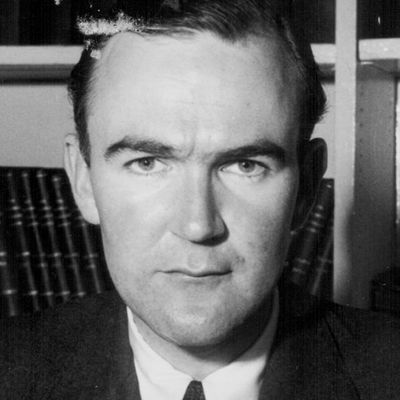
One of The CrownÔÇÖs strengths is the way it seamlessly shifts between stories of major international prominence and political intrigue ÔÇö the palace visit of the Kennedys or the Suez Crisis, for instance ÔÇö and humanistic ones that people donÔÇÖt seem to know much about. In the first season, the best example of this revolved around the power dynamic shared between Winston Churchill and his portrait artist, Graham Sutherland. This time around, itÔÇÖs the tale of an amiable chap named Lord Altrincham.
When we first meet Altrincham (John Heffernan) leaving a London television studio with a smug look on his face, heÔÇÖs painted as an easy villain: He just insulted Queen Elizabeth in print and on TV! He got punched in the face and deserved it, damn it! Yet as the story progresses in season twoÔÇÖs fifth episode, ÔÇ£Marionettes,ÔÇØ itÔÇÖs clear that Lord Altrincham is not only justified in his astute criticisms of Queen Elizabeth and the royal family ÔÇö her speech at the car factory really was that terrible ÔÇö but his advice will eventually be needed for the sake of the greater good.
ÔÇ£In the end, almost all of Lord AltrinchamÔÇÖs proposed changes to the monarchy were implemented,ÔÇØ the closing credits of the episode tell us. ÔÇ£The palace later conceded that Lord Altrincham did as much as anyone in the 20th century to help the monarchy.ÔÇØ So, who exactly is this fellow we should thank for keeping the lights of Buckingham Palace on? And why didnÔÇÖt we hear of him sooner? The Crown likes to take creative liberties with its narratives, of course, so with that in mind, hereÔÇÖs what you need to know about the real Lord Altrincham.
Were Lord AltrinchamÔÇÖs attacks on the Queen really a national sensation?
Indeed so. As the show depicts, in August 1957, he wrote an extremely critical article about the royal familyÔÇÖs struggles in the National and English Review, a publication that he edited. (His father was the previous owner and editor.) Lord Altrincham ÔÇö a well-educated man who studied at Eton and Oxford ÔÇö believed the criticisms were of ÔÇ£constructiveÔÇØ nature, although the public was split on how mean-spirited they seemed. Among other sentiments, he wrote the QueenÔÇÖs speaking style was ÔÇ£a pain in the neckÔÇØ; that she was incapable of original thought, thanks to the constant presence of her ÔÇ£tweedyÔÇØ courtiers; and that she had the personality of ÔÇ£a priggish school girl.ÔÇØ To lessen the blow, he added that he had ÔÇ£no intention other than to serve the monarchy, to strengthen it and to enable it to survive,ÔÇØ summing up his thoughts as such: ÔÇ£It is too precious an institution to be neglected. And I regard servile acceptance of its faults as a form of neglect.ÔÇØ
How did things play out after it was published?
That infamous ITV television interview occurred just as The Crown showcased, during which Lord Altrincham articulately elaborated his thoughts on the royal family and didnÔÇÖt repent his criticisms. (Perhaps the most prominent burn at the time: The Archbishop of Canterbury called him ÔÇ£very silly.ÔÇØ) ÔÇ£IÔÇÖm quite sure this needed saying,ÔÇØ he said in the interview, noting that the letters he received were ÔÇ£three to oneÔÇØ in his favor. ÔÇ£The QueenÔÇÖs speech, I feel, her own natural self is not allowed to come through. ItÔÇÖs a sort of synthetic creature that speaks. Not the Queen as she really is. If she herself would be allowed to speak, the effect would be wonderful.ÔÇØ He was also slapped by a member of the League of Empire Loyalists while exiting the studio, who shouted, ÔÇ£Take that!ÔÇØ Sadly, no footage of that exists.
Did he actually have a meeting with the Queen?
ThereÔÇÖs no public record of a meeting ever taking place, as juicy as the show made it out to be. However, in the biography Monarch: The Life and Reign of Elizabeth II, author Robert Lacey confirmed that Lord Altrincham met with another prominent palace insider instead.
Inside the palace, some people realized there was truth in what Altrincham said. Within two days of the furore, the outspoken peer had been contacted through a mutual friend to arrange a private meeting with Martin Charteris, the queenÔÇÖs assistant private secretary. Thirty years later, in the course of a political meeting at Eton, Charteris told Altrincham, ÔÇ£You did great service to the monarchy and IÔÇÖm glad to say so publicly.ÔÇØ
Two of Lord AltrinchamÔÇÖs recommendations to improve the monarchy ÔÇö having the Queen broadcast her annual Christmas message on a television, and eliminating the ÔÇ£social lopsidednessÔÇØ of debutante balls ÔÇö were eventually implemented. Just a few months after publishing his criticism, 1957 introduced the tradition of televised messages, and debutante parties were cancelled the following year. (As opposed to becoming a more informal event that The Crown concluded with.) ÔÇ£We actually delayed cancelling the [debutante] presentation parties for a year,ÔÇØ a couturier at the time recalled in Monarch, owing to the fact the Queen didnÔÇÖt want to be seen ÔÇ£jumping to Lord AltrinchamÔÇÖs command.ÔÇØ
Did he generate controversy like this ever again?
Not really, but he lived a very interesting life. As The Crown noted, he eventually disclaimed his title when it became legal to do so under the Royal Assent in 1963, deciding to use his birth name, John Grigg, instead. GriggÔÇÖs obituary in the Telegraph ÔÇö he died on New YearÔÇÖs Eve in 2001 at the age of 77 ÔÇö reported that he continued to be a respected writer, journalist, and biographer for numerous British publications until his health deteriorated in his later years. (His three-part biography of David Lloyd George was particularly revered.) In fact, in the subsequent days after Princess DianaÔÇÖs death, Grigg praised the QueenÔÇÖs divisive televised broadcast as ÔÇ£the best I have ever heard from her.ÔÇØ A family man, he also adopted two children with his wife, Patsy.


